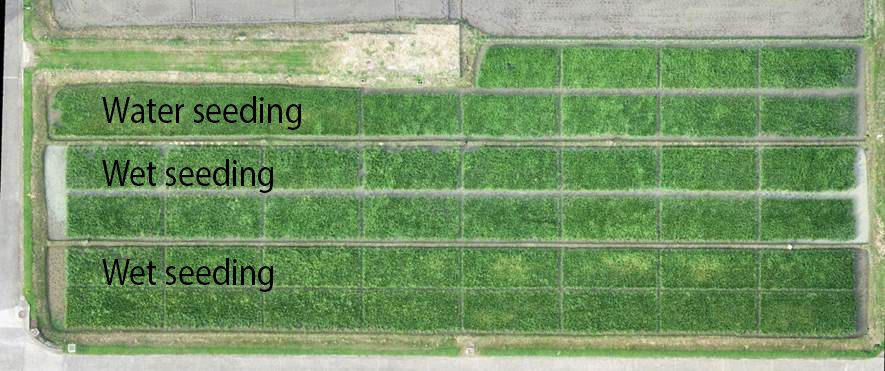Technology aims to develop water- and labor- efficient “Water Seeding” in lieu of Wet Seeding in Farmers’ Practice
JFE Steel Corporation has joined the Direct Seeded Rice Consortium (DSRC), led by the International Rice Research Institute (IRRI), in March 2019, in order to test the performance of coating rice seeds with iron powder in flooded paddies in the Philippines. Through this partnership, JFE Steel aims to compile an international manual on rice direct seeding with iron-coated seeds through the collaboration of the members of the DSRC.
Rice is a staple food in Asia and has been planted traditionally by labor-intensive transplanting, which includes raising seedlings, pulling, bundling, and transporting them to the fields. While transplanting is mechanized in some countries, mechanization has not gained popularity in many Asian countries, with seedlings mostly planted by hand.
Direct seeding, or seeding directly into the fields without transplanting, offers many advantages, including requiring less labor at a time when many farming populations are aging, and with younger, more educated generations are seeking urban jobs. IRRI established DSRC as an international public-private partnership to develop and refine direct seeding practices and technologies, which can contribute to preserving resources and environmental sustainability.
In many parts of Asia, farmers have developed a direct seeding method called “wet seeding” in which pre-germinated seeds are broadcast-seeded in damp or well-puddled soil. While faster and requiring less labor than transplanting, wet seeding often requires fields to be drained first, to ensure that seeds anchor on the ground rather than float away in the water. Unfortunately, draining is a waste of water, nutrients, and fertile soil clay minerals, and also stimulates the growth of weeds and weedy rice growth.
An innovative direct seeding method has been successfully developed in Japan, which uses seeds coated with iron powder. This raises the density of the seeds, allowing them to be sown directly in flooded paddies, eliminating the need for forced drainage as well as reducing problems with weeds.
This new seeding method is called “water seeding”, which has been little practiced in Asia before. Coating seeds with iron powder also reduces the occurrence of seed-borne diseases and minimizes incidences of birds eating the seeds.
This method was developed by the National Agriculture and Food Research Organization in 2004 and has been popularized mainly by machine manufacturers and Japan’s National Federation of Agricultural Cooperative Associations (ZEN-NOH). It is currently used on about 18,000 ha of rice fields in Japan, making it the most widely diffused direct seeding method in the country.
In studies of the iron coating of rice, scientists do not predict serious adverse effects on the environment or humans. The amount of Fe applied as a seed coating is minimal relative to the amount of Fe naturally occurring in the soil. Reduced Fe powder is commonly used in daily life, including as a body warmer and oxygen absorber in the food industry. Iron-containing materials, such as the slag produced at smelting works, are recommended for application to degraded paddy soils as amendments (see “A review of iron-coating technology to stabilize rice direct seeding onto puddled soil” - dl.sciencesocieties.org/publications/aj/pdfs/109/3/739)
JFE Steel begun researching iron powder suitable for seed coatings 10 years ago and produced a suitable iron powder in 2014, Konabijin®. In studies Konabijin is highly appreciated by customers and performs well in farmers’ fields across Japan. JFE Steel will collaborate with IRRI and DSRC members to test and evaluate Konabijin-coated seeds in DSRC test fields.
Konabijin® is a registered trademark of JFE Steel Corporation.
###
About JFE Steel Corporation
JFE Steel Corporation, one of the world’s leading integrated steel producers, was established through the consolidation of NKK Corporation and Kawasaki Steel Corporation in 2003. The company operates several steelworks in Japan and numerous branch offices and affiliates throughout the world. JFE Steel leverages world-class technologies and know-how to produce a wide range of products based on its “Only One, Number One” strategy of focusing on unique and best-in-class products. The company reported consolidated sales of 2,830 billion yen and consolidated crude steel output of 27.88 million tons in the fiscal year ended March 2019.
###
Images
 Seeds, intact (left) and coated with iron powder (right)
Seeds, intact (left) and coated with iron powder (right)

Production of iron-coated seeds at IRRI. Coating work by hand for small-scale farmers (left) and with machine for mechanized farmers (right).

Seeding iron-coated seeds in IRRI fields in wet (upper, drained just after puddling) and water (lower, with standing water) seeding.

Crop establishment in water (in the front, little weeds) and wet (behind, with IRRI staff working) seeding of iron-coated seeds at IRRI, 17 July 2019.

Aerial view of experimental fields at IRRI, 14 August 2019.

